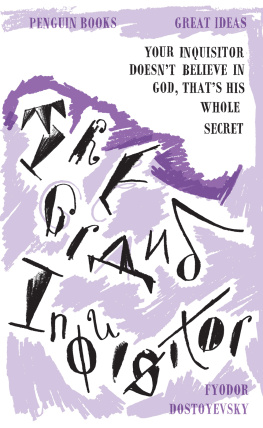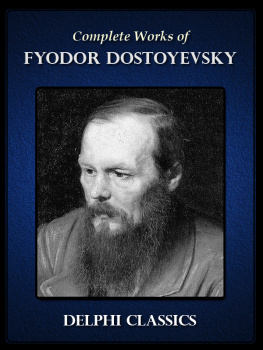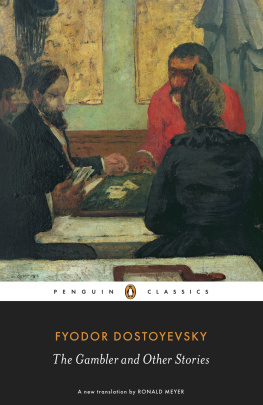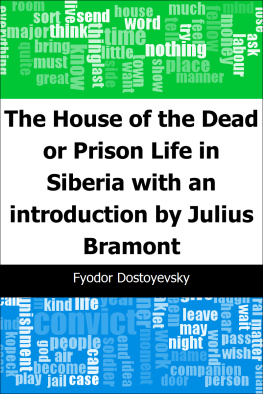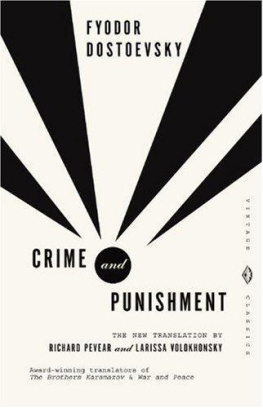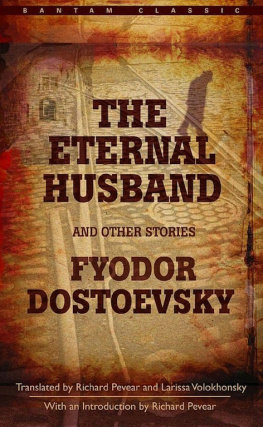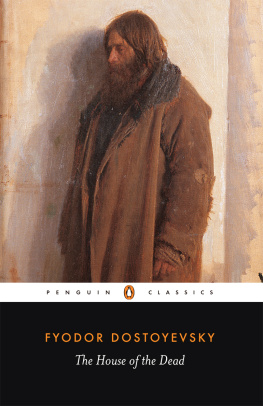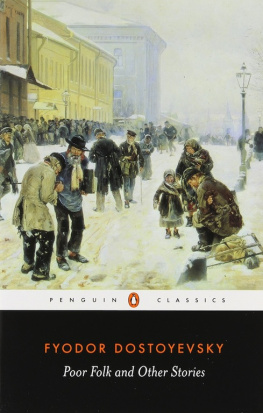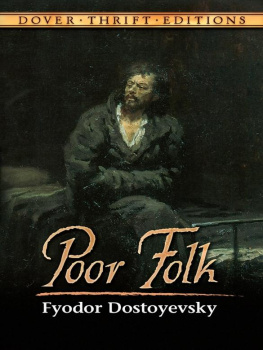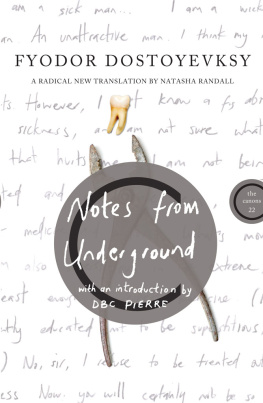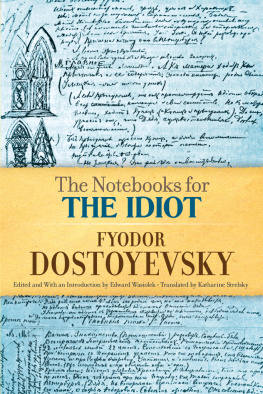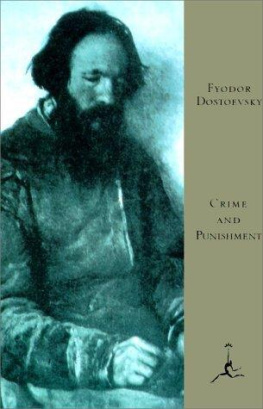Fyodor Dostoyevsky - The Grand Inquisitor
Here you can read online Fyodor Dostoyevsky - The Grand Inquisitor full text of the book (entire story) in english for free. Download pdf and epub, get meaning, cover and reviews about this ebook. year: 2003, publisher: Penguin Books Ltd, genre: Art. Description of the work, (preface) as well as reviews are available. Best literature library LitArk.com created for fans of good reading and offers a wide selection of genres:
Romance novel
Science fiction
Adventure
Detective
Science
History
Home and family
Prose
Art
Politics
Computer
Non-fiction
Religion
Business
Children
Humor
Choose a favorite category and find really read worthwhile books. Enjoy immersion in the world of imagination, feel the emotions of the characters or learn something new for yourself, make an fascinating discovery.
- Book:The Grand Inquisitor
- Author:
- Publisher:Penguin Books Ltd
- Genre:
- Year:2003
- Rating:5 / 5
- Favourites:Add to favourites
- Your mark:
- 100
- 1
- 2
- 3
- 4
- 5
The Grand Inquisitor: summary, description and annotation
We offer to read an annotation, description, summary or preface (depends on what the author of the book "The Grand Inquisitor" wrote himself). If you haven't found the necessary information about the book — write in the comments, we will try to find it.
The Grand Inquisitor — read online for free the complete book (whole text) full work
Below is the text of the book, divided by pages. System saving the place of the last page read, allows you to conveniently read the book "The Grand Inquisitor" online for free, without having to search again every time where you left off. Put a bookmark, and you can go to the page where you finished reading at any time.
Font size:
Interval:
Bookmark:
PENGUIN BOOKS
Published by the Penguin Group
Penguin Books Ltd, 80 Strand, London WC2R 0RL , England
Penguin Group (USA) Inc., 375 Hudson Street, New York, New York 10014, USA
Penguin Group (Canada), 90 Eglinton Avenue East, Suite 700, Toronto, Ontario, Canada M4P 2Y3
(a division of Pearson Penguin Canada Inc.)
Penguin Ireland, 25 St Stephens Green, Dublin 2, Ireland
(a division of Penguin Books Ltd)
Penguin Group (Australia), 250 Camberwell Road, Camberwell, Victoria 3124, Australia
(a division of Pearson Australia Group Pty Ltd)
Penguin Books India Pvt Ltd, 11 Community Centre, Panchsheel Park, New Delhi 110 017, India
Penguin Group (NZ), 67 Apollo Drive, Rosedale, North Shore 0632, New Zealand
(a division of Pearson New Zealand Ltd)
Penguin Books (South Africa) (Pty) Ltd, 24 Sturdee Avenue,
Rosebank, Johannesburg 2196, South Africa
Penguin Books Ltd, Registered Offices: 80 Strand, London WC2R 0RL , England
www.penguin.com
The Grand Inquisitor taken from The Brothers Karamazov, first published 1880
The House of the Dead, First Impressions (1), First Impressions (2) and First Impressions (3) taken from The House of the Dead, first published 1862
This selection first published in Penguin Books 2009
The Grand Inquisitor translation copyright David McDuff, 1993, 2003
All other material translation copyright David McDuff, 1985, 2003
All rights reserved
Except in the United States of America, this book is sold subject to the condition that it shall not, by way of trade or otherwise, be lent, re-sold, hired out, or otherwise circulated without the publishers prior consent in any form of binding or cover other than that in which it is published and without a similar condition including this condition being imposed on the subsequent purchaser
ISBN: 978-0-14-195664-0
Fyodor Dostoyevsky
18211881
The Grand Inquisitor is a poema or narrative argument from Book Five of The Brothers Karamazov, which considers the idea of freedom. In the preceding chapter, Ivan introduces it to his brother Aloysha:
Listen Aloysha, dont laugh, but I once composed a poema I did it about a year ago. If youre able to waste another ten minutes or so with me, would you let me tell you what it says?
Youve written a poema?
Oh no, I didnt write it, Ivan said, laughing, never in my life have I written down so much as two lines of verse. No, I dreamed this poema up and committed it to memory. I dreamed it up with passion. You shall be my first reader, or listener, rather, Ivan said with an ironic smile. Shall I tell you what it says or not?
By all means, Aloysha managed to get out.
My poema is entitled The Grand Inquisitor, a preposterous thing, but I feel like telling it to you.
In The House of the Dead Dostoyevsky recreates the time he spent in a Siberian convict prison through his fictionalized narrator Alekzandr Petrovich Goryanchikov.
The Brothers Karamozov
You see, even here we cant get by without a preface a literary preface, that is, confound it! Ivan said, laughing. And what kind of an author am I? Look, the action of my poem takes place in the sixteenth century, and back then as a matter of fact, this ought still to be familiar to you from your days at school back then it was the custom in works of poetry to bring the celestial powers down to earth. Dante I need hardly mention. In France the magistrates clerks and also the monks in the monasteries used to give entire dramatic spectacles in which they brought on to the stage the Madonna, the angels, the saints, Christ and even God Himself. Back in those days it was all very unsophisticated. In Victor Hugos Notre Dame de Paris, under the reign of Louis XI, an edifying spectacle is given to the people free of charge in the auditorium of the Paris Town Hall, to celebrate the birthday of the French Dauphin, under the title Le bon jugement de la trs sainte et gracieuse Vierge Marie, in which she herself appears in person and pronounces her bon jugement. In our own country, in the Moscow of pre-Petrine antiquity, dramatic spectacles of almost the same kind, especially of stories from the Old Testament, also took place from time to time; but, in addition to dramatic spectacles, there passed throughout all the world a large number of tales and verses in which when necessary the saints, the angels and all the powers of heaven wrought their influence. The monks in our monasteries also occupied themselves with the translation, copying and even the composition of such poems, and in such times, too: under the Tartar yoke. There is, for example, a certain little monastic poem (from the Greek, of course) entitled The Journey of the Mother of God Through the Torments, with scenes and with a boldness that are not inferior to those of Dante. The Mother of God visits hell, and her guide through the torments is the Archangel Michael. She beholds the sinners and their sufferings. This hell, incidentally, contains a most entertaining category of sinners in a burning lake: those of them who sink into this lake so deep that they are unable to swim to its surface again are forgotten by God a phrase of exceptional force and profundity. And lo, the shocked and weeping Mother of God falls down before Gods throne and appeals to him to grant forgiveness to all who are in hell, all whom she has seen there, without distinction. Her entreaty with God is of colossal interest. She implores him, she will not depart, and when God draws her attention to the nailed hands and feet of His Son and asks her: How can I forgive his torturers? she commands all the saints, all the martyrs, all the angels and archangels to fall down together with her and pray for the forgiveness of all without discrimination. The upshot of it is that she coaxes from God a respite from the torments each year, from Good Friday to Whit Sunday, and out of hell the sinners at once thank the Lord and loudly cry unto Him: Just and true art thou, O Lord, that thou hast judged thus. Well, my little poem would have been in similar vein, had it appeared in those days. He appears on my proscenium; to be sure, in my poem. He does not say anything, only makes his appearance and goes on his way. Fifteen centuries have now passed since He made his vow to come in his kingdom, fifteen centuries since his prophet wrote: Behold, I come quickly. But of that day and that hour knoweth no man, not even the Son, but only my Father in heaven, as He himself prophesied while yet on the earth. But humankind awaits him with its earlier faith and its earlier tender emotion. Oh, with even greater faith, for fifteen centuries have now passed since the pledges have ceased to be lent to man from the heavens:
Thou must have faith in what the heart saith,
For the heavens no pledges lend.
And only faith in that which is said by the heart! To be sure, there were many miracles back in those days. There were saints who effected miraculous healings; to some righteous men, according to their life chronicles, the Queen of Heaven herself came down. But the Devil does not slumber, and in humankind there had already begun to grow a doubt in the genuineness of these miracles. Just at that time there appeared in the north, in Germany, a terrible new heresy. An enormous star, burning as it were a lamp (thats the church, you see), fell upon the fountains of the waters, and they were made bitter. These heresies began blasphemously to contradict the miracles. But all the more ardent was the faith of those who remained true believers. The tears of humankind ascended to Him as before, He was awaited, loved, trusted in, people thirsted to suffer and die for him, as before And for how many centuries had humankind prayed with faith and ardour: O God the Lord, show us light, for how many centuries had it appealed to Him that He, in His immeasurable compassion, should deign to come down among His supplicants. He had been known to condescend before and had visited certain men of righteousness, martyrs and holy cenobites while yet they lived on earth, as it is written in their Lives. Among us Tyutchev, who believed profoundly in the truth of His words, announced that
Font size:
Interval:
Bookmark:
Similar books «The Grand Inquisitor»
Look at similar books to The Grand Inquisitor. We have selected literature similar in name and meaning in the hope of providing readers with more options to find new, interesting, not yet read works.
Discussion, reviews of the book The Grand Inquisitor and just readers' own opinions. Leave your comments, write what you think about the work, its meaning or the main characters. Specify what exactly you liked and what you didn't like, and why you think so.

